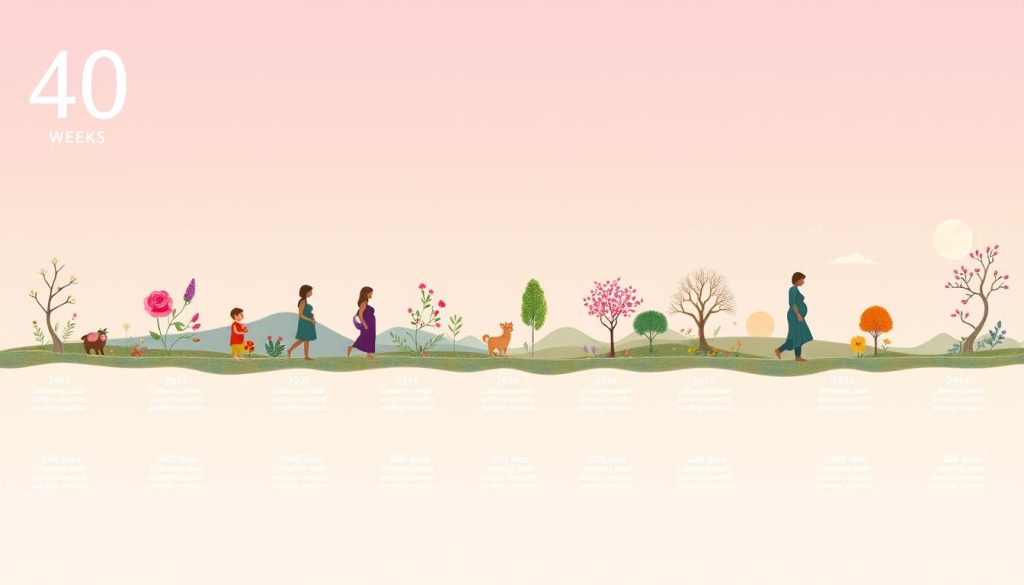Pregnancy is both exciting and overwhelming. This guide helps you through every stage, from early signs to postpartum recovery. It’s perfect for first-time moms or those with experience. You’ll get the info and resources for prenatal care, fetal development, and more.
During pregnancy, you’ll go through many physical and emotional changes. It’s key to be ready for what’s coming. This guide covers pregnancy stages, fertility treatments, and more. It gives you the knowledge and confidence for your journey.
Key Takeaways
- Pregnancy usually lasts 40 weeks or 280 days. The due date is estimated based on the last menstrual period (LMP).
- Gestational age is measured in weeks and days. It shows how far along you are, from the LMP.
- Prenatal appointments are every four weeks in the first two trimesters. They’re more frequent in the third trimester.
- Ultrasounds are common to check the baby’s growth and development.
- Expectant mothers are tested for conditions like anemia and gestational diabetes at certain stages.
Understanding Pregnancy and Conception
Pregnancy is a remarkable and life-changing experience for many individuals. It starts with the fertilization of an egg by a sperm. Then, the fertilized egg implants in the woman’s uterus. While pregnancy often occurs naturally after sexual intercourse, there are also assisted reproductive technologies (ARTs) that can help when natural conception is not possible.
What is Pregnancy?
Pregnancy is the period when a fetus develops in a woman’s uterus. It lasts about 40 weeks, from the first day of her last menstrual period to the birth. During this time, the fertilized egg grows into an embryo and then a fetus. The mother’s body changes to support the growing life.
How Does Pregnancy Happen?
Pregnancy usually occurs after sexual intercourse, when a sperm fertilizes an egg. The fertilized egg travels to the uterus and implants in the uterine lining. It continues to grow and develop there. Conception typically happens within 12 to 24 hours after ovulation. However, the chances of conception vary, with only 25-30% of sexual encounters resulting in pregnancy. The likelihood decreases with age.
Assisted Reproductive Technology (ART)
For some individuals, natural conception may not be possible due to various medical conditions or fertility issues. In these cases, assisted reproductive technology (ART) can help. This includes procedures like in vitro fertilization (IVF) and intrauterine insemination (IUI). These procedures assist in the fertilization of the egg and the implantation of the embryo by medical professionals.

Understanding the basics of pregnancy and conception is crucial for individuals planning to start a family or facing fertility challenges. By learning about the natural process of conception and the available assisted reproductive technologies, individuals can better prepare for a healthy pregnancy journey.
Tracking Your Pregnancy Journey
Pregnancy is a thrilling and changing time, filled with stages and milestones. Knowing about pregnancy length, due date calculation, and gestational age helps you feel more confident. It makes your journey through pregnancy more enjoyable.
How Many Weeks is Pregnancy?
A typical pregnancy lasts about 40 weeks or 280 days. But, every pregnancy is different. Doctors use your last menstrual period to figure out your pregnancy stage. Tracking your weeks helps you understand your baby’s growth and get ready for their arrival.
How to Calculate Your Due Date
Finding your due date can be a bit confusing. Doctors usually count from your last menstrual period, adding 280 days. But, if you conceive a few days early or late, your due date might change.
Gestational Age and Trimesters
Pregnancy is split into three trimesters, each with its own changes and milestones. The first trimester, from weeks 1 to 12, brings early signs like nausea and tiredness. The second trimester, from weeks 13 to 28, is when you might feel more energetic and start feeling your baby move. The third trimester, from weeks 29 to 40, is all about getting ready for your baby’s birth.
Understanding pregnancy length, due dates, and trimesters helps you track your journey. It prepares you for the exciting changes that are coming.

The BabyCenter pregnancy and baby tracker app is full of useful information and tools. It offers daily updates, week-by-week baby development, and trusted health resources. This app helps you feel confident and prepared for your pregnancy journey.
Prenatal Care and Preparing for Childbirth
Prenatal care is key for checking your health and your baby’s growth during pregnancy. You’ll have regular visits with your healthcare provider. These include physical exams, screenings, and talks about your pregnancy and childbirth.
Ultrasounds, tests for diabetes, and planning for labor and recovery are part of it. Taking prenatal classes and making a birth plan can also prepare you. The Centers for Disease Control and Prevention say babies without prenatal care are at higher risk.
The American College of Obstetricians and Gynecologists suggests certain visit schedules. You’ll see your healthcare provider once a month from weeks 4 to 28. Then, it’s twice a month until week 36. After that, you’ll go weekly until your baby is born. These visits help track your progress and address any issues.

